Case studies
Industries
Resources
TikTok Collection
NEW
Table of Contents
Ever get the sneaking suspicion that you could be squeezing more out of your email marketing strategy?
You’re not alone.
Look: we love social media around here, but there’s no denying the sheer power of email. Arguably the last remaining relic of old-school Internet marketing, email has been the go-to solution for brands looking to capture leads, build their lists, and monetize subscribers for decades.
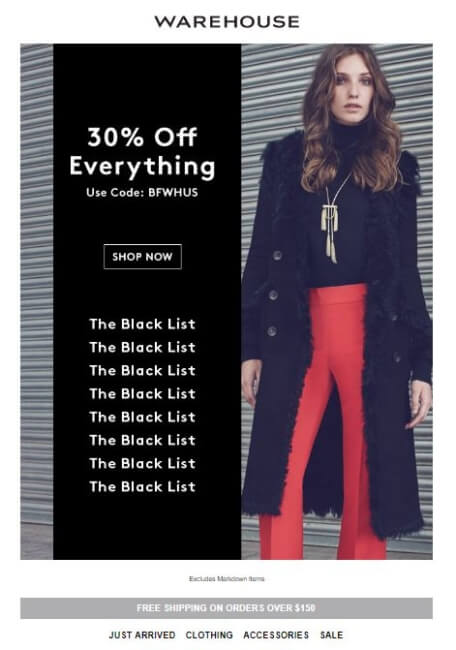
And email marketing isn’t losing any steam, either.
According to a recent report, email marketing generates a median ROI of 40:1, which makes it the most effective advertising tool. Although modern brands are indeed laser-focused on turning their social followers into customers, there’s certainly a financial incentive to stick with email.
That said, email marketers shouldn’t ignore the best practices of social media when it comes to their marketing messages.
In fact, the average email marketing strategy could be fine-tuned into something truly special by including one not-so-secret ingredient.
User Generated Content.
We’ve seen time and time again how User Generated Content helps brands on Instagram by increasing conversions, building trust, and painting posts with a more personal touch. Check out how 14 brands are ruling instagram with these UGC examples strategies here.
Why not apply those same principles to your email marketing strategy?
Sure, email marketing already has so many moving pieces. From subject lines to calls-to-action and design, marketers are timid when it comes to switching up their strategies. Why throw UGC into the mix when there’s already so much to worry about?
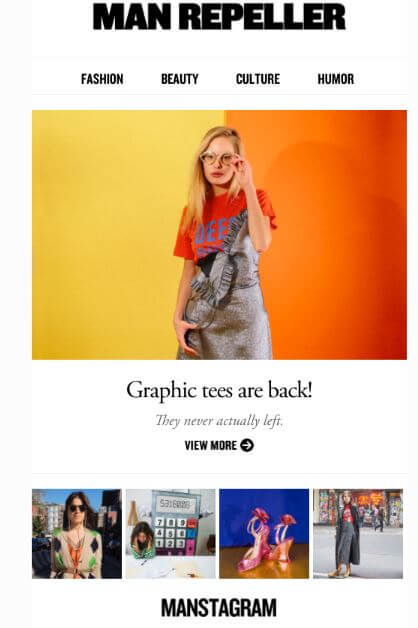
The answer is simple. UGC has the potential to plug up the holes in your marketing strategies when it comes to conversions and click-throughs. Consider some of the most common challenges of email marketers according to Campaign Monitor:
Well, guess what?
User Generated Content can help with easing all of these pain points.
Listen: you don’t have to trash your current email marketing strategy or start from scratch. With some small tweaks and a bit of creativity, you can integrate UGC into your existing and future email campaigns.
Below we’ve broken down some awesome examples of how modern brands are integrating UGC into their email marketing strategies.
They’re making it look easy, too. That’s because for the most part, it is.
So, let’s dive right in.
Perhaps the easiest way to harness the power of UGC by email is through hashtags. Creating a hashtag for your brand not only connects you with your followers, but also allows you to curate UGC in a snap.
Here’s a straightforward example of an email-based hashtag campaign from oVertone. This message encourages email subscribers to show off their products through a branded hashtag on Instagram:
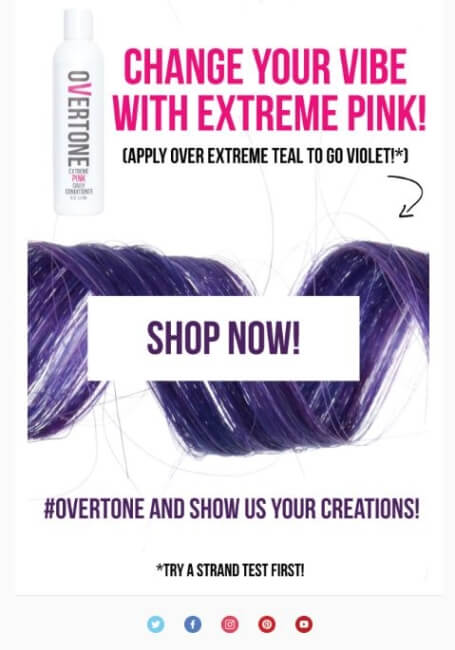
And given the tens of thousands of posts on the #OVERTONE tag, there’s no denying that subscribers are taking notice:
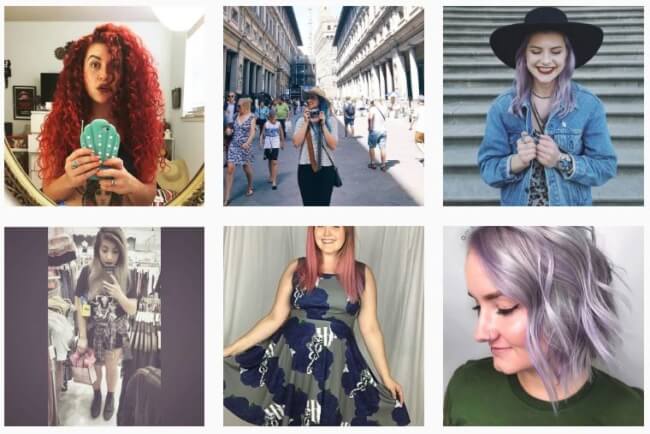
As a result, oVertone has plenty of content to choose from for their next regram.
Take note that this example uses a company-specific tag (in this case #OVERTONE). If you’re already running a seasonal or time-sensitive campaign, that’s fair game as well.
For example, check out how Chaco uses email marketing to advertise for their Instagram hashtag contest:
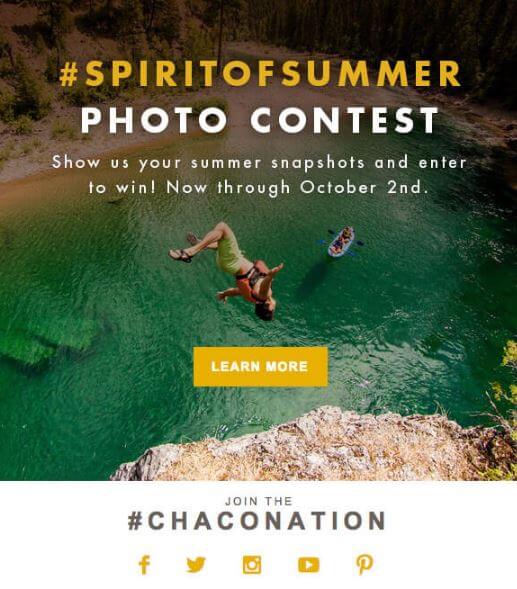
Here’s some food for thought: just because someone’s bought from you before doesn’t necessarily mean they’re connected to your social feeds.
Don’t assume that your email list already knows about your hashtags. Promoting your hashtag via email can be done in a matter of seconds as displayed by these examples. Besides, you can’t expect your hashtag to spread if nobody knows about it, right?
In short, hashtags are an easy target for integrating UGC into your email marketing strategy.
And you can use your hashtag as a way to get more users to engage with the pop-ups on your site – meaning a longer email list! One other helpful email marketing tip: display your pop-up 7 seconds after your visitors have entered your site. This gives them exactly enough time to form a first impression but doesn’t leave enough time for them to exit your site without seeing your pop-up.
Okay, here’s where things get interesting.
Piggybacking on the popularity of hashtag campaigns, savvy brands are showing off their satisfied customers through email. This type of promotion effectively serves as an advertisement for your products and social feeds at the same time.
But in this case, your customers are your ads.
For example, Black Milk Clothing puts their products and customers on display in their marketing emails. They even sweeten the deal offering up a $50 voucher for customers who find themselves in their email lookbook:
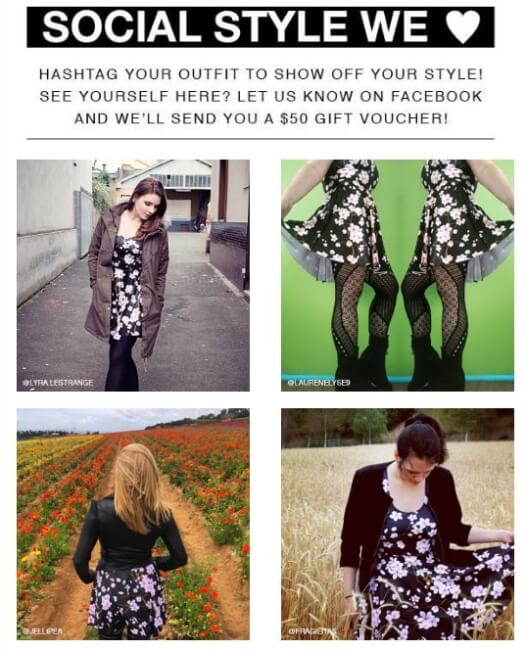
Crazy, right?
But such a campaign is brilliant because it encourages the creation of UGC and keeps social followers glued to Black Milk’s emails. Again, marketers don’t necessarily need to totally separate their social feeds from their email-based content. This campaign encourages followers to interact with Instagram, email, and Facebook accordingly.
The more channels you’re able to engage your customers with, the better.
MeUndies similarly puts their customer photos on display through a hashtag campaign. This humorous example is definitely a far-cry from a traditional marketing message or sales pitch:
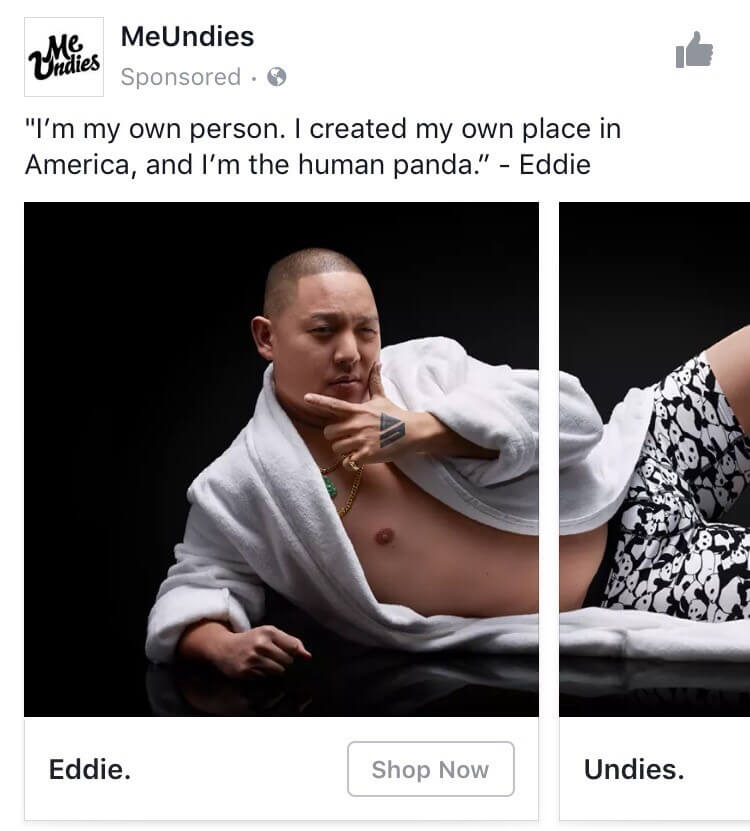
Bear in mind that not every single message from such brands is necessarily going to contain UGC. That said, there’s no reason why your emails can’t at least encourage users to submit photos. Check out this footer from the previously noted MeUndies email:
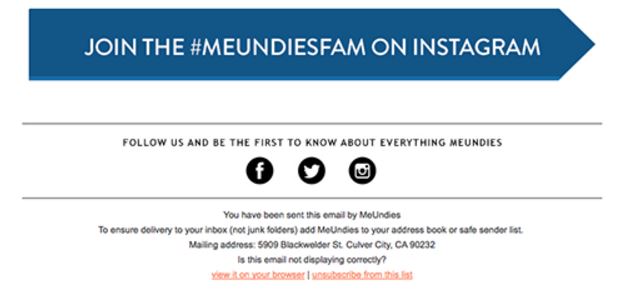
These messages and calls-to-action represent a breath of fresh air versus the spam filling your subscribers’ inboxes. That’s the beauty of UGC, though. As long as you’re consistently curating it, you can use it in your advertising campaigns accordingly.
But sometimes if you want a customer photo, you have to ask for it.
For example, ThinkGeek features customer action shots in their weekly email newsletters as part of a contest. Winners are rewarded with $100 in swag and get a spot in the aptly-named Geek Hall of Fame:
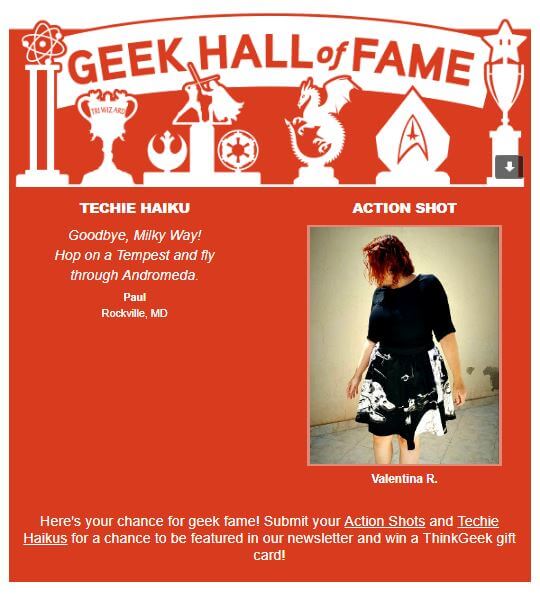
This provides further incentive for subscribers to check and see if they’ve been featured. As noted in the giveaways rules, customers must post their photos to various social profiles as part of their entry:
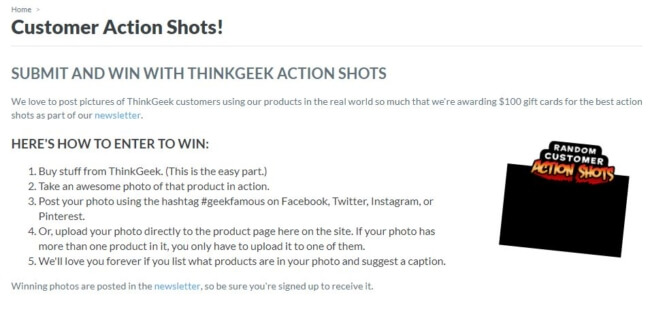
And as an added bonus, the winners are immortalized on-site:
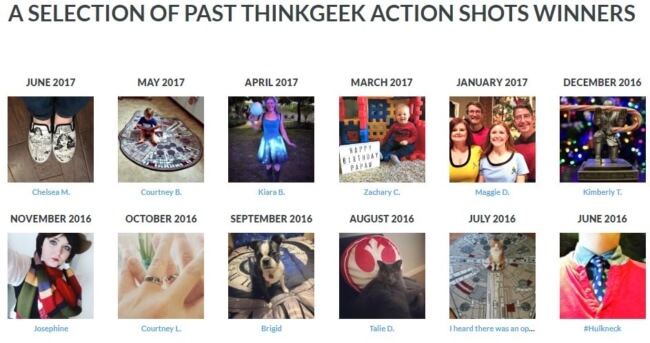
Featuring customer and product photos like these might seem like little more than a novelty.
However, bear in mind how these types of emails can help solve the most common problems plaguing email marketers:
Even so, the benefits of UGC as part of your email marketing strategy don’t stop there.
Content creation of any kind can be a major pain, but visual social content, in particular, requires careful editing and attention to detail. The more opportunities we can wring the most out of any given piece of content the better, right?
If you have an awesome user submitted photo that you’d love to leverage in your email campaigns, why let it go to waste?
For example, check out this seemingly ordinary marketing email from Coastal:
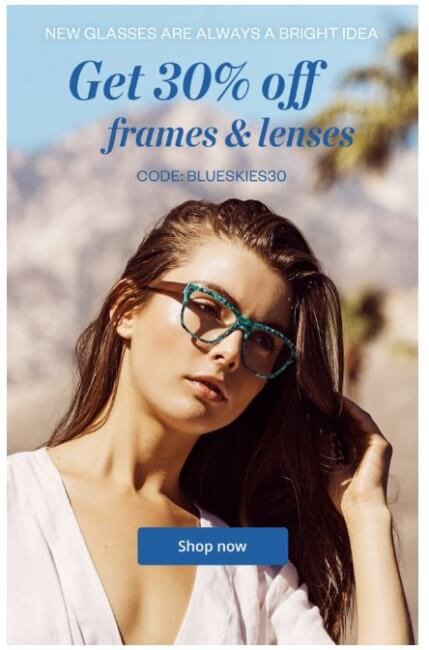
Upon further inspection, I noticed that this particular photo popped up in their Instagram feed, too:

Lazy? Nah.
Smart? You bet.
Why go chasing around for an awesome product photo when a user submitted one is right under your nose? Doing so ensures that you make the most of your UGC curation and don’t let a single customer photo go unnoticed.
Remember how email marketers traditionally struggle with giving their emails a personal touch? A snapshot of your social feed can do the trick. Check out how Ginetta finishes off their marketing emails with their latest photos, giving a glimpse into the human element behind their brand:
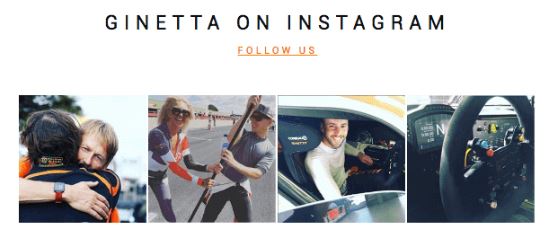
There’s no rule that says your social content can’t leave the confines of your Instagram or any other feed. Start thinking of your customer photos and UGC as crucial pieces of content that you can use time and time again.
Additionally, doing so can inject some serious personality into your email marketing strategy. Your social content is a great way to remind your subscribers that there’s more to your brand than just offers and deals.
Although this tip may seem like a no-brainer, it’s shocking how many marketers squander their email list because they don’t promote it to their social followers.
Sure, your fans are more likely to buy via Instagram or Facebook than ever. Even so, there’s no reason why those same followers shouldn’t be part of your email list.
Let’s use TOMS as an example of how to effectively encourage social followers to transform into email subscribers. This post funnels followers directly to the brand’s bio:
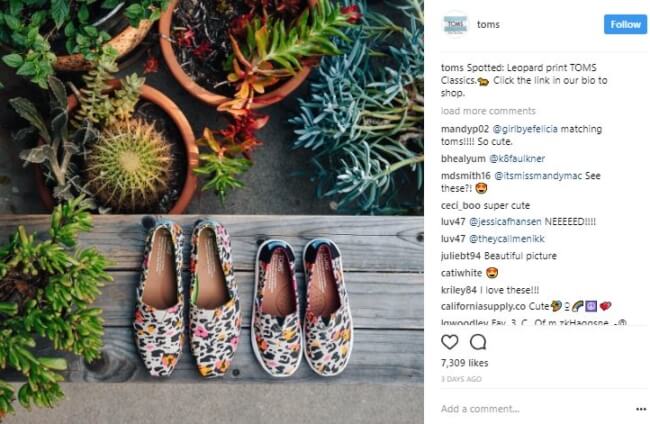
…which looks something like this:
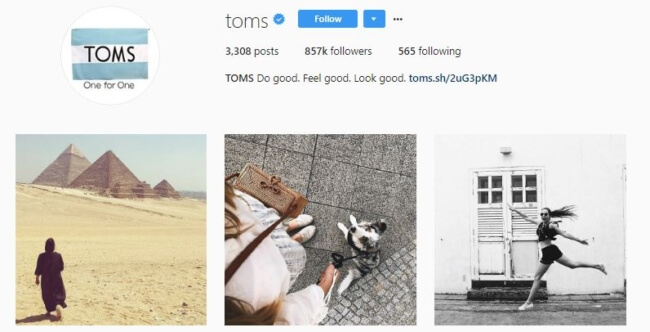
…and upon clicking through leads us to a product page with following opt-in form:

…which results in sleek UGC messages like ones:
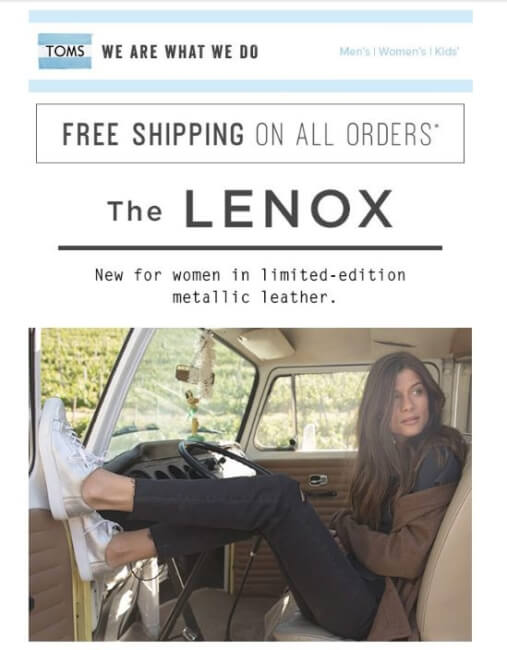
Just as you should be using UGC as part of your email marketing strategy, the converse is also true. Marketers must be willing to take their social followers off-site and into an email opt-in, especially when hunting for sales.
Keep in mind that those willing to provide you with their email address are arguably your hottest leads. Learning from such opt-ins can be incredibly valuable in terms of the type of content they want to see or the products they’d be interested in buying.
Curating feedback from your list is as simple as asking a question.
“What types of products would you like to see in the future?”
“What can we do to create a better buying experience?”
But some brands are taking major steps to use email and UGC to learn more about their customer base.
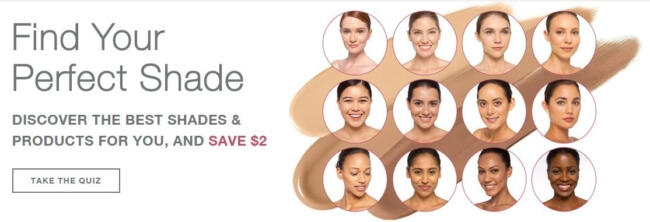
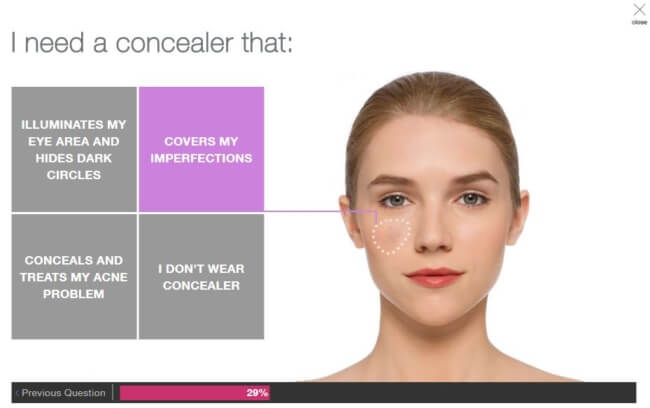
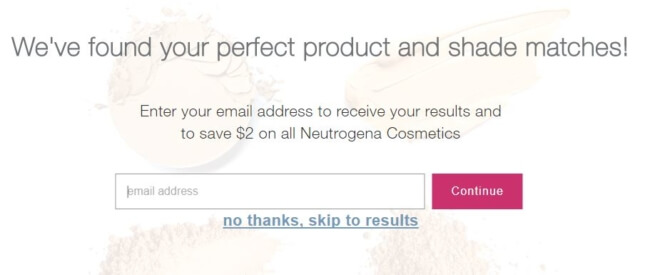
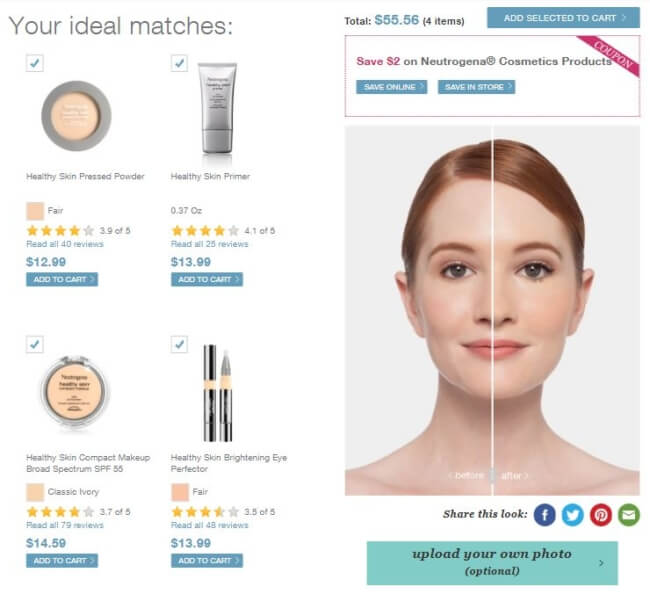
Take Neutrogena, for example. They’re managing to build up their email list via user submitted quizzes, a smart social shopping trend that’s becoming more common in the world of eCommerce:
Based on the responses as you progress, the quiz determines which products would be best for you:
This is a brilliant strategy for segmenting quiz-takers via email to eventually present them with product recommendations. In this particular case, Neutrogena provides the taker a choice. Either enter their email for a discount or see the products by themselves:
And as predicted, takers are provided with products as well as an email coupon:
Obviously what Neutrogena is doing here is rather advanced. This strategy still speaks to the need for brands to uncover creatives ways to encourage more opt-ins. Although we might not think of quizzes as traditional UGC, feedback and commentary from your potential customers is invaluable in its own right.
On that note, it’s important to keep in mind what information to ask for in your opt-in. Truly the most important thing is simple: their email address. Many websites also ask for a name in their opt-in forms in order to send personalized emails, which is also okay. But keep in mind that whenever you add an input field to your opt-in, your conversion rate decreases by 50%.
Many marketers make the mistake of treating social content and email as two totally different entities.
By integrating UGC into your email marketing strategy, you get the best of both worlds in terms of your marketing efforts. Not only do you get to double-dip your social content, but also encourage more eyes on your hashtag campaigns and products.
The key takeaway here? Email and social media shouldn’t be totally separated. This is especially true as experimenting with UGC through email is so simple. Again, consider strategies such as…
Any of these options are easy pickings for brands looking to drive more engagement with their email marketing strategy. Whether your goal is more sales via email or leading customers to your shoppable social feed, UGC and email combined are a powerful combination.
Just like email, the benefits of User Generated Content marketing is well-documented. Expect to see more UGC popping up in your inbox as more and more brands understand the influence of User Generated Content when it comes to their emails.
Hopefully, you’ll find opportunities to do the same as well.
So, how might you integrate User Generated Content into your marketing strategy? Which of these examples stand out the most to you? Let us know in the comments below!
If you want more on UGC, visit our extensive guide on the benefits of User Generated Content.